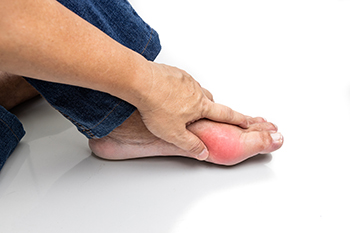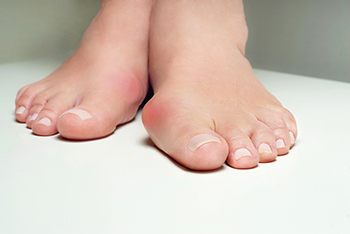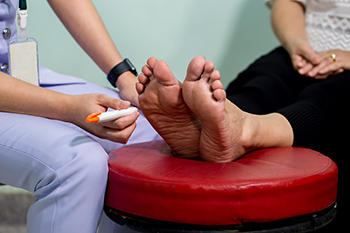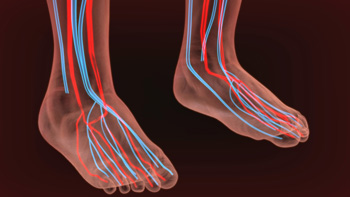Items filtered by date: June 2023
When Do Gout Attacks Commonly Occur?

An early symptom of the foot condition that is known as gout may be detected in the blood. Elevated purine or uric acid levels may indicate gout has developed, which can lead to painful attacks. Gout is a form of arthritis and generally affects the joints in the big toe. It can cause debilitating pain and may be accompanied by swelling and redness. Gout can develop from genetic reasons, or from eating foods that have large amounts of purines. These types of foods can include shellfish, red meat, and drinks that are made with heavy amounts of sugar. Many people have gout attacks at night, and pain can be severe during the first several hours. Effective prevention techniques may consist of reducing the number of foods that are eaten that have purines, eliminating alcohol, and drinking plenty of water daily. If you have had one or frequent gout attacks, it is strongly suggested that you are under the care of a podiatrist who can help you to manage this condition.
Gout is a foot condition that requires certain treatment and care. If you are seeking treatment, contact one of our podiatrists from Palmetto Podiatry Group of Anderson. Our doctors will treat your foot and ankle needs.
What Is Gout?
Gout is a type of arthritis caused by a buildup of uric acid in the bloodstream. It often develops in the foot, especially the big toe area, although it can manifest in other parts of the body as well. Gout can make walking and standing very painful and is especially common in diabetics and the obese.
People typically get gout because of a poor diet. Genetic predisposition is also a factor. The children of parents who have had gout frequently have a chance of developing it themselves.
Gout can easily be identified by redness and inflammation of the big toe and the surrounding areas of the foot. Other symptoms include extreme fatigue, joint pain, and running high fevers. Sometimes corticosteroid drugs can be prescribed to treat gout, but the best way to combat this disease is to get more exercise and eat a better diet.
If you have any questions please feel free to contact our office located in Anderson, SC . We offer the newest diagnostic and treatment technologies for all your foot and ankle needs.
Bunions and Climbing

Bunions are a specific kind of foot affliction that can develop when a bony bump forms on the side of the foot, commonly at the big toe. Bunions may also develop near the pinky toe. Living with a bunion can make particular physical activities significantly more difficult to engage in. For example, climbing is an activity that many Americans enjoy. However, climbing with ill-fitting footwear can increase one’s risk of developing a bunion. In particular, climbing with shoes that are too tight can ultimately lead to bunion formation. Since climbing requires a person to put a significant amount of pressure on the feet, climbing with bunions may prove to be challenging. If you are a climber and want to prevent or treat a foot condition like bunions, it is suggested that you schedule an appointment with a podiatrist today.
If you are suffering from bunions, contact one of our podiatrists of Palmetto Podiatry Group of Anderson. Our doctors can provide the care you need to keep you pain-free and on your feet.
What Is a Bunion?
A bunion is formed of swollen tissue or an enlargement of boney growth, usually located at the base joint of the toe that connects to the foot. The swelling occurs due to the bones in the big toe shifting inward, which impacts the other toes of the foot. This causes the area around the base of the big toe to become inflamed and painful.
Why Do Bunions Form?
Genetics – Susceptibility to bunions are often hereditary
Stress on the feet – Poorly fitted and uncomfortable footwear that places stress on feet, such as heels, can worsen existing bunions
How Are Bunions Diagnosed?
Doctors often perform two tests – blood tests and x-rays – when trying to diagnose bunions, especially in the early stages of development. Blood tests help determine if the foot pain is being caused by something else, such as arthritis, while x-rays provide a clear picture of your bone structure to your doctor.
How Are Bunions Treated?
- Refrain from wearing heels or similar shoes that cause discomfort
- Select wider shoes that can provide more comfort and reduce pain
- Anti-inflammatory and pain management drugs
- Orthotics or foot inserts
- Surgery
If you have any questions, please feel free to contact our office located in Anderson, SC . We offer the newest diagnostic and treatment technologies for all your foot care needs.
Foot Problems From Diabetes

Many people with diabetes develop foot pain that directly results from their disease. One such condition is diabetic neuropathy, which is caused by nerves that have been damaged by high levels of blood sugar. The cause of severe foot pain is known as focal neuropathy, which affects one nerve at a time. On the other hand, peripheral neuropathy affects all the nerves from the spine to the feet. Factors that make diabetic foot pain more likely to occur include uncontrolled blood sugar levels, poor blood flow to the feet, plaque buildup in the arteries and veins, and genetics. In addition, the risk of diabetic foot pain increases with alcohol abuse and smoking. Having diabetic neuropathy can lead to difficulty walking, foot ulcers, and frequent foot infections. A regular foot hygiene routine is the best way to prevent these conditions from forming or worsening. For more information about foot pain related to diabetes, it is suggested that you make an appointment with a podiatrist.
Diabetic foot care is important in preventing foot ailments such as ulcers. If you are suffering from diabetes or have any other concerns about your feet, contact one of our podiatrists from Palmetto Podiatry Group of Anderson. Our doctors can provide the care you need to keep you pain-free and on your feet.
Diabetic Foot Care
Diabetes affects millions of people every year. The condition can damage blood vessels in many parts of the body, especially the feet. Because of this, taking care of your feet is essential if you have diabetes, and having a podiatrist help monitor your foot health is highly recommended.
The Importance of Caring for Your Feet
- Routinely inspect your feet for bruises or sores.
- Wear socks that fit your feet comfortably.
- Wear comfortable shoes that provide adequate support.
Patients with diabetes should have their doctor monitor their blood levels, as blood sugar levels play such a huge role in diabetic care. Monitoring these levels on a regular basis is highly advised.
It is always best to inform your healthcare professional of any concerns you may have regarding your feet, especially for diabetic patients. Early treatment and routine foot examinations are keys to maintaining proper health, especially because severe complications can arise if proper treatment is not applied.
If you have any questions please feel free to contact our office located in Anderson, SC . We offer the newest diagnostic and treatment technologies for all your foot and ankle needs.
Why Live with Pain and Numbness in Your Feet?
Common Symptoms of Poor Circulation

Patients who have poor circulation may notice their feet are cold, regardless of the temperature in the room. Additionally, having swollen feet may also be a sign of poor circulation. This may be a result of reduced blood flow, possibly causing the kidneys to function improperly. People who are constantly tired may have poor circulation, which can come from a lack of oxygen and nutrients. A weakened immune system and poor circulation may be linked together, possibly improving with regular exercise. Poor circulation can cause the scalp to become dry, and may lead to a gradual loss of hair. Patients who are afflicted with this condition may notice their nails are affected, as they can become fragile and break easier. If you have the above symptoms and your feet are affected, it is suggested that you confer with a podiatrist who can properly diagnose and treat poor circulation.
While poor circulation itself isn’t a condition; it is a symptom of another underlying health condition you may have. If you have any concerns with poor circulation in your feet contact one of our podiatrists of Palmetto Podiatry Group of Anderson. Our doctors will treat your foot and ankle needs.
Poor Circulation in the Feet
Peripheral artery disease (PAD) can potentially lead to poor circulation in the lower extremities. PAD is a condition that causes the blood vessels and arteries to narrow. In a linked condition called atherosclerosis, the arteries stiffen up due to a buildup of plaque in the arteries and blood vessels. These two conditions can cause a decrease in the amount of blood that flows to your extremities, therefore resulting in pain.
Symptoms
Some of the most common symptoms of poor circulation are:
- Numbness
- Tingling
- Throbbing or stinging pain in limbs
- Pain
- Muscle Cramps
Treatment for poor circulation often depends on the underlying condition that causes it. Methods for treatment may include insulin for diabetes, special exercise programs, surgery for varicose veins, or compression socks for swollen legs.
As always, see a podiatrist as he or she will assist in finding a regimen that suits you. A podiatrist can also prescribe you any needed medication.
If you have any questions, please feel free to contact our office located in Anderson, SC . We offer the newest diagnostic and treatment technologies for all your foot care needs.

